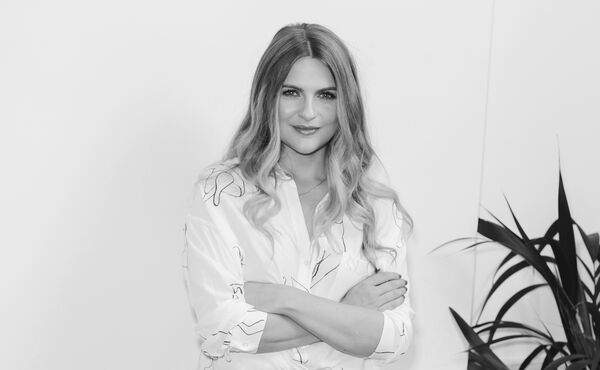Confidence is a powerful tool. It can help us tap into our full potential and enhance our overall happiness and wellbeing. But how do we master it? Try these expert tips.
Do you ever feel like you could be achieving so much more in life or discovering exciting new experiences, if only you had the confidence to take that next step? You’re not alone. It’s thought that around 85% of people lack confidence in one or more areas of their lives.
But did you know, research has proven that being more confident can improve our overall happiness? In 2014, a research study found that students with higher levels of self-belief also reported significantly higher scores on the happiness scale. While a similar study in 2013 found that higher levels of confidence can also impact our overall wellbeing.
If that wasn’t enough, master life coach and happiness expert, Lydia Kimmerling, makes a particularly compelling case for taking the time to work on this tool of empowerment. “Being more confident can significantly improve our lives, unlocking our true potential by fostering resilience, assertiveness, and the courage to take on new challenges,” she says. “Self-confidence can enable us to overcome obstacles, embrace opportunities, and build fulfilling relationships.”
But before we dive into the expert tips that can help us become more confident every day, let’s take a deep dive into what confidence really is, and what can block us from tapping into our full potential.

WHAT IS CONFIDENCE?
Not to be confused with arrogance, confidence is an empowering feeling that can help to propel us towards the things we really want in life. The Oxford English Dictionary defines it as: the mental attitude of trusting in or relying on a person or thing; firm trust, reliance, faith.
According to Kimmerling, that’s a pretty spot on explanation of what it means to possess a solid sense of self-confidence. “Confidence is an inner knowing that you are worthy and capable, which arises from embracing your unique strengths, experiences and lessons,” she explains. “It stems from self-awareness and self-acceptance, and allows you to stand tall and authentic in the face of challenges.”
Ludovica Colella, a CBT therapist and coach who specialises in helping women boost their confidence, agrees. She adds that by adopting a more positive growth mindset, we can also learn to continually build on that powerful feeling.
“Having a growth mindset means that you can see challenges as opportunities to grow. You are open minded and adaptable, which makes it more likely for you to improve and refine your skills,” says Colella. “This creates a positive loop: the more skills and knowledge you acquire, the more your confidence increases, which in turn leads you to seek further learning experiences. Being confident is not about being perfect or knowing everything, but rather about having faith in your capacity to learn and grow.”
THE POTENTIAL BLOCKERS
From negative self-talk and a fear of judgement, to comparing ourselves with others, and how we frame what we consider to be our past ‘failures’, the root cause of what’s blocking our full potential can be uniquely varied.
But while our individual concerns may differ, Colella has identified a few common habits that can immediately thwart that growth mindset that’s key to building ourselves up from the inside.
“A big barrier is the huge misconception that in order to do something, we first need to feel confident. When in reality, confidence often follows action – the more we take action and gain experience, the more our confidence in our ability to deal with challenges grows,” she explains.
“Another is the belief that confidence is a fixed personality trait that some are born with and others aren't. This is a detrimental belief because it stops people from even thinking that they can become more confident. Confidence is actually a skill that can be developed through practice and effort, rather than an innate quality.”
So with that said, let’s jump into the expert tips that’ll help you to build confidence every day, whether it’s at work or out socialising.
HOW TO BE MORE CONFIDENT… AT WORK
-
Ask for feedback
A key component of confidence is self-awareness, so Colella suggests requesting constructive feedback from colleagues or supervisors to help you recognise your strengths, and identify areas of improvement. -
Daily affirmations
To boost confidence at work, Kimmerling advises practising self-affirmations daily, acknowledging your accomplishments and setting clear goals.
HOW TO BE MORE CONFIDENT… SOCIALISING
-
Expand your comfort zone
While this could look different for all of us, Colella recommends gradually exposing yourself to new situations. For some it may be going to a networking event, for others it might mean attending a party where you don’t know anyone. Remember, the more you expand your comfort zone, the more you’ll increase your belief in your abilities to deal with challenging or new situations. -
Focus on genuine connections
Kimmerling suggests challenging any negative thought patterns that arise in social settings, and focusing on building genuine connections rather than seeking others’ approval.
READ MORE: How to feel confident in your body – because all shapes and sizes are beautiful
HOW TO BE MORE CONFIDENT… AT HOME
-
Learn something new every day
This could include reading a book or an article, watching a documentary, or watching a YouTube video about a topic you’re interested in. Either way, it’ll open your mind to new perspectives, expand your knowledge, and nurture your curiosity, says Colella. -
Take time to pause
To build your confidence in day-to-day interactions, Kimmerling notes the importance of self-care, meditation or grounding exercises to centre yourself and maintain inner peace.

HOW TO BE MORE CONFIDENT… QUICKLY
When we asked our experts for a quick tip to help bring us back to a place of confidence and empowerment during a wobble, they both said the same thing – take a few deep breaths, and practice visualisation.
“Visualisation is also called ‘mental rehearsal’,” explains Colella. “When we engage in mental rehearsal, for example by visualising ourselves presenting in front of an audience and being successful, the brain activates neural pathways similar to those it would during the actual performance of the task. Our brains don’t distinguish between vividly imagined experiences and real ones, so this is an effective way to actually trick your brain into believing you’re already acing that challenge.”
Kimmerling adds: “Remember to breathe deeply and connect with your body. Visualise success, and remind yourself of past achievements. Shift your focus from perfection to authenticity, allowing yourself to be human. Embrace any nervous energy as excitement, and remind yourself that you have what it takes to shine brightly.”
Want to take things further? Boost your confidence with our 8-minute self-love mirror meditation
-
Promotions
View full details€14,32 €17,90 -
Promotions
View full details€14,32 €17,90 -
Promotions
View full details€11,12 €13,90










